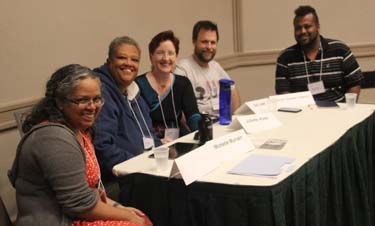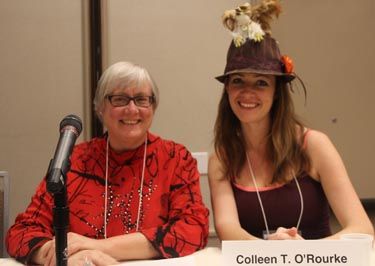Last month Marion and I attended FOGCon 5 in Walnut Creek, California (in the San Francisco Bay area) where I served on a panel called “When the Setting is a Character.” FOGCon, which stands for Friends of the Genre Convention, has a literary bent. Marion and I are going to discuss our experience here, and we’ve got a book to give away to a commenter.
Marion, what did you think of your first FOGCon?
Terry, I expected FOGCon to be fun because you recommended it, but this conference exceeded my expectations! From the Walnut Creek Marriott Hotel staff – consistently helpful, friendly and cheerful – to the thoughtful and varied panels, this was a great weekend. And I love that they had a “Ghost of Honor,” Joanna Russ, devoting an evening presentation to her and her work.
Marion, I first attended FOGCon last year and was very taken with the notion of a small convention where the chances were good I could meet a lot of people, including some authors, instead of getting lost in the crush. Last year’s guests of honor — Seanan McGuire and Tim Powers — are two of my favorite writers, so I couldn’t resist. This year’s guests of honor, Catherynne Valente and Kim Stanley Robinson, are also high up on my list of great SF writers, and I had such a good time last year that I decided to make attending a habit.

“When Your Traveler is my Colonizer” panel: Mary Ann Mohanraj, Michelle Murrain, Juliette Wade, Zed Lopez, Na’amen Gobert Tilahun
Marion: This year’s theme was “The Traveler,” and panels ranged from “From Ice Planet Hoth to Mars; How Can We Write About Real Environments?” to “The Road as Metaphor,” and “Tenses for Time Travelers and Other Abominations of Language.” They offered thoughtful and rich discussions on travelers and strangers (which are often two sides of the same coin). It’s pretty exciting to have a biologist on the world-building panel, or a linguist and two anthropologists on the language panel.
Terry: I also enjoyed the panels that seemed to be aimed right at the specialties of the guests, too. “Stories within Stories within Stories within Stories…” was clearly pointed directly at Valente’s two-volume work, The Orphan’s Tales; she was on the panel and was terrific. The panel you cite, “From Ice Planet Hoth…” was a perfect venue for Robinson, too.
One of the things I really enjoyed about the conference, and particularly the fact that it was small (under 300 attendees, I think) was that everyone was so friendly and welcoming.
Marion: I thought there were closer to 150, which was one of my “plusses.” You could actually talk to people.
Mary Ann Mohanraj intrigued me from the first day. Mohanraj is the Clinical Assistant Director of fiction and literature at the University of Illinois at Chicago. She is also the founder of the magazine Strange Horizons. While she reads and writes SFF, her reading recommendations winged way beyond genre. I got a hand cramp from writing so fast.

Terry Weyna & Megan E. O’Keefe on the “The Setting is Another Character” panel.
Let’s talk about your panel, “When the Setting is a Character.” While Marie Brennan, author of the LADY TRENT MEMOIRS series, is an interesting writer and person, I didn’t feel that she was particularly well-prepared to moderate your panel. I loved your examples of works, like Catherynne Valente’s Palimpsest, especially the canal in that book, and China Miéville’s BAS-LAG series, where the setting truly drives the plot just as a character would. I thought other panelists talked more about things that made setting work for them. It was interesting, just not what I had signed up for. I did love Karen Brenchley’s comments that in the classic Robin Hood stories, Sherwood Forest is as much a character as Robin or the Sheriff.
Terry: I agree that my panel didn’t go the way I expected it to, which was a bit disappointing. At least in preparing for it I happened upon some books I haven’t read before, or have in my library but haven’t gotten to yet. Brennan told me afterwards that she doesn’t really like panels that focus on listing titles or speaking of specific books, which explains my disconnect; I tend to think of panels as all about specific books. But once again, the fact that I was on a panel at all is one of the advantages of attending a small convention. I really appreciated how so many women were on panels, and not as tokens, either.
What was your favorite panel?
Marion: I got a lot out of the panel on language. Juliette Wade spoke about creating a “scaffolding” for language, whether you are using an existing foreign language or an imagined one. Use the scaffolding to create a context each time the word is used so that the reader has “a lovely constellation of clues” to guide them. I realize that this is my favorite type of reading experience and makes me feel truly immersed in the world.
Terry: I liked the panel on Alternate Universes I attended. They discussed interesting questions I’ve never considered, like whether portal fantasies are really alternate universe fantasies. (Answer: not generally, but some, like NARNIA, really are alternate universes.) I got a long list of books to read out of this panel, which ranged from Golden Age SF to the most modern SF. I’ve already read Philip K. Dick’s The Man in the High Castle as a result of this discussion. I also got a kick out of Kim Stanley Robinson’s panel on John Muir, kind of a sidelight to SF and fantasy, but fascinating, with a gorgeous slide show of Robinson’s hiking in the Sierra Mountains.
Both you and I took advantage of the writers’ workshop component of the convention. I believe it’s a regular feature, and I found it useful — I wound up with an insight into one of my characters that hadn’t hit me before. There are always risks, of course; the leader of my workshop doesn’t like horror, and I’d submitted a horror story. Still, I found the comments useful, and will be writing a new draft of my story based on what I heard in that room. Did you get as much out of that process as I did?
Marion: I had an “unintended consequences” moment when two participants pointed out that the clue I’d carefully placed in the first paragraph to show the tale took place in 1860s California only confused them! So yes, it was a valuable process. I love the workshop component.
This is a small conference with an academic, egalitarian approach to SFF. I think it will become a staple conference for me. It’s welcoming and exciting to hear academics, writers and fans all discussing SFF as serious fiction.
Terry: I agree. In fact, I like this conference so much that I even volunteered for some of the behind-the-scenes business of every convention this year, and will again next year. I’ve attended a couple of big conferences over the years — World Fantasy several times, the International Conference on the Fantastic in the Arts many times, Nebula Weekend twice and Readercon once — and while they are grand fun, they don’t have quite the welcoming atmosphere that this con does. And the folks attending the conference are, as you said, eagerly and happily serious about SF. I’ll see you there next year!
Tell us about your own convention experience in the comments, or give us your reaction to Marion and Terry’s Big Adventure. One commenter will win a copy of Marie Brennan’s A Natural History of Dragons or the book of their choice from our Stacks.




Really interesting to read about your experiences! Wish there were more events like this in my neck of the woods (/world)
It sounds like you both had a great time! It was fascinating to read about your experiences and they ways they dovetailed/diverged. (And here I was thinking that they called it FOGCon just because it was in San Francisco!)
Jana, Terry’s theory is that they named it FOGCon because of San Francisco, and then came up with the acronym, and that makes sense.
It’s a sound theory!